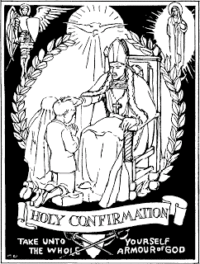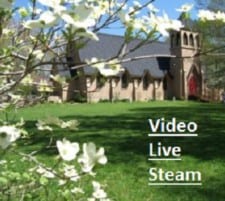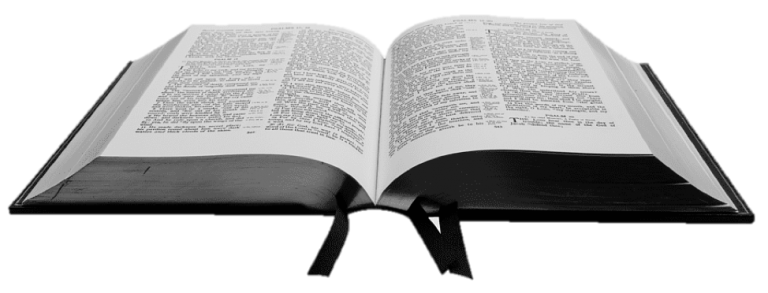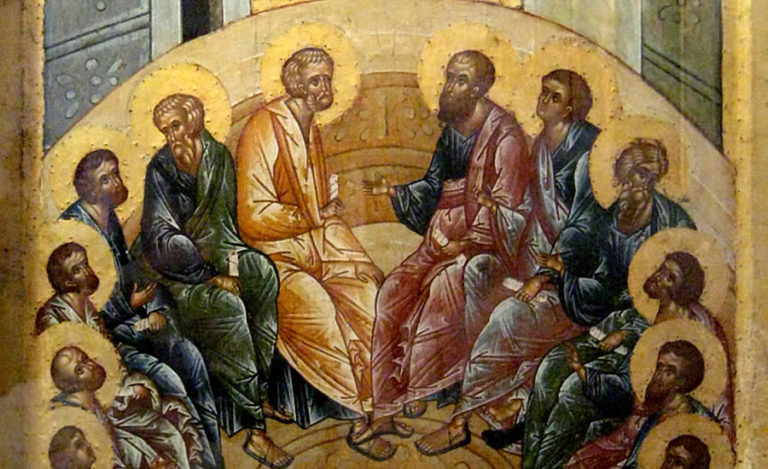Confirmation Adult Manual 2019 volume 10 of 10

1928 BOOK OF COMMON PRAYER:
The Book of Common Prayer has been called “The Bible rearranged for Christian worship.” Over three-quarters of the book consist of selections taken directly from Holy Scripture. The Old Testament Book of Psalms is incorporated in its entirety, for example, and much of the liturgy of the Eucharist is directly from the New Testament. The Gospels and Epistles are bodily lifted from the King James (Authorized) version of the Bible. The canticles in the Daily Offices are scriptural in origin, from both the Old and New Testaments. Because our Anglican faith and worship are so closely bound with the Book of Common Prayer, it is important to each of us to know and understand the history of its creation and to be thoroughly familiar with its contents (of which some we should know by memorization – the italicized and underline below.)
The Decalogue
GOD spake these words, and said:
I am the LORD thy God; Thou shalt have none other gods but me.
Thou shalt no make to thyself any graven image, nor the likeness of any thing that is in heaven above, or in the earth beneath, or in the water under the earth; thou shalt not bow down to them, nor worship them; for I the Lord thy God a jealous God, and visit the sins of the fathers upon the children, unto the third and fourth generation of them that hate me; and show mercy unto thousands in them that love me and keep my commandments.
Thou shalt not take the Name of the LORD thy God in vain; for the LORD thy God will not hold him guiltless, that taketh his Name in vain.
Remember that thou keep holy the Sabbath-day. Six days shalt thou labor, and do all that thou hast to do; but the seventh day is the Sabbath of the LORD thy God. In it thou shalt do no manner of work; thou, thy son, and thy daughter, thy man-servant, and thy maid-servant, thy cattle, and the stranger that is within thy gates. For in six days the LORD made heaven and earth, the sea, and all that in them is, and rested the seventh day: Wherefore the LORD blessed the seventh day, and hallowed it.
Honor thy father and thy mother; that thy days may be long in the land which the LORD giveth thee.
Thou shalt do no murder.
Thou shalt not commit adultery.
Thou shalt not steal.
Thou shalt not bear false witness against thy neighbor.
Thou shalt not covet thy neighbor’s house, thou shalt not covet thy neighbor’s wife, nor his servant, nor his maid, nor his ox, nor his ass, nor any thing that is his.
The Summary of the Law:
God does want your respect: but more than respect, he wishes and demands your love. After all, he made you. He sent his Son to die for your sins, and he is preparing a home for you in heaven (yes, He has been busy – for you.)
Loving God isn’t the same thing as feeling good about him. Emotions (feeling good about him) is not enough – love is more than feelings and words, but actual actions. By doing the Fathers will you establish a very special relationship with Christ His Son Jesus (Mat 12:50 For whosoever shall do the will of my Father which is in heaven, the same is my brother, and sister, and mother. Mar 3:35 For whosoever shall do the will of God, the same is my brother, and my sister, and mother.) It is by doing more than talk, but by being obedient to the Will of God that you become His brother, sister, or mother.
Jesus tells us that this is the most important commandment from God. So God loves you and He wants you to love him (totally and completely.)
Jesus tells us that there is another commandment like the first one: “Love your neighbor as yourself.” Who is your neighbor? Everyone is your neighbor. Does this mean that you have to love mean and nasty people? Of course it does! But it doesn’t mean you have to like them. We love the person, but not necessarily the person that sin has turned them into…Love the Sinner, not the sin. Remember: we love other people not because they are nice; we love them because God loves them as much as he loves us.
So there are Two Great Commandments:
Thou shalt love the Lord thy God with all thy heart, with all thy soul and with all thy mind.
Thou shalt love thy neighbor as thyself.
How can you do this?
Prayer
First, you must understand that God loves you. Without his love you cannot love anyone else. God’s love in you is called grace. You don’t deserve it (it is unmerited,) but you receive it whenever you ask for it. So you must ask for it often. You ask for grace when you pray. The first way to keep the Great Commandments is prayer.
Prayer is both talking to and listening to God. When you “say your prayers” remember that it is God you talk to, and he gets all of your attention. You have spoken to teachers, parents and friends without giving them all your attention, but God can tell when you’re thinking of something else when you pray. He would rather spend five minutes with you while you concentrate on him than spend ten minutes with you while you look around the room in a daze.
A wonderful prayer for the spirit of prayer (P. 594 BCP) “O Almighty God, who pourest our on all who desire it, the spirit of grace and of supplication; Deleiver us, when we draw nigh to thee, from coldness of heart and wanderings of mind, that with stedfact thoughts and kindled affections, we may worship thee in spirit and in truth; through Jesus Christ our Lord. Amen
You must pray every day. You are glad about some things, sad about others, sorry for others and worried about still others. God wants to hear you talk about them. Later, you will learn a few short and easy ways to pray. The important thing to remember is to pray often.
Also, understand that sometimes you pray with people and sometimes you pray alone. Both kinds of prayer are important. Why do you pray with other people? Think of it this way: God didn’t make you to live alone: he doesn’t want you to pray alone all the time, either.
The Lord’s Prayer
Jesus gave the Apostles an example of how to talk with God. If it is good for them, then it is great for us! His disciples once asked him to do this: “Teach us to pray.” And he did. All Christians should memorize the Lord’s Prayer and use it as an example for other prayers. The Lord’s Prayer will help you to remember to pray for the right things.
The Lord’s Prayer has another name: the Our Father. This name comes from the first two words of the Prayer. Some people call it the Lord’s Prayer because Jesus taught it.
Here are the two passages from the Bible where the prayer is written for us. Matthew 6:9-13 and Luke 11:1-4. Under them is the same prayer from the Holy Communion service in the Book of Common Prayer on page 82 which is the form Anglicans memorize
Our Father,
who art in heaven, Hallowed be thy Name. Thy kingdom come. Thy will be done, On earth as it is in heaven. Give us this day our daily bread. And forgive us our Trespasses, As we forgive those who trespass against us. And lead us not into temptation, But deliver us from evil. For thine is the kingdom, and the power, and the glory, for ever and ever. Amen
Discussion:
Our Father, who art in heaven,
God is in heaven. So is Jesus who sits on the right hand of God as we say in the Creed. We shall be with them in heaven, too, if we love God here on earth.
By saying that God is in heaven, you make him the goal of your life.
Notice that the prayer is plural or corporate – Our Father.
hallowed be thy name.
To “hallow” something means to make it holy, or “set apart”. God’s name is special, and you should never use it without respect, fear and love.
God’s name is already holy, but you are praying that you and others would treat it that way.
Thy kingdom come.
When Jesus comes again, he will bring his kingdom with him. He hasn’t come yet.
We pray for Jesus’ kingdom to come because we will be completely happy only when it does come.
Thy will be done, on earth as it is in heaven.
In heaven, the saints do only God’s will.
We pray that we on earth may be like them and do God’s will here, too.
Give us this day our daily bread.
All food is a gift from God.
We should ask for everything we need.
We should give thanks for everything we need and receive from God.
And forgive us our trespasses,
“Trespass” is an old-fashioned word for sin, which means thinking or acting against God’s will.
God will forgive our sins if we ask him and try to do better.
as we forgive those who trespass against us.
God will forgive our sins only if we forgive people who do wrong things to us.
When you forgive someone, you stop being angry.
If you find it hard to forgive someone, ask God for help. Remember that Jesus forgives sins, and he is happy to do it.
And lead us not into temptation,
Temptation does not make us sin, but it makes us think about sin. For example, if your mother baked cookies and she told you, “Don’t eat any; they are for my party”, the cookies would tempt you to disobey your mother. If you find a wallet on the street, you may be tempted to keep it, although you know you should give it to the police.
We should ask God to keep us away from temptation.
but deliver us from evil.
Sometimes evil things happen when people sin. If you shoot a man and he dies, that is evil.
Sometimes evil things happen and we do not know why. If you had the flu and died, that is evil too, but it may not be your fault.
We should ask God to protect us from evil. He never willingly afflicts people with evil.
For thine is the kingdom and the power and the glory,
God is the king of everything.
God has power over everything.
God is more beautiful than everything.
When you tell God these things, you are praising him.
for ever and ever.
God does not change – ever.
His goodness and power will last forever.
Amen.
“Amen” means you believe what you are saying.
“Amen” means you are loyal to what you believe.
Fasting
To fast means to go without eating for a time. This doesn’t mean that you don’t eat enough. It means that you give up a meal or a favorite food on occasion. Why do you fast? Jesus fasted, and it worked. It helped him to concentrate on saying his prayers and on helping people who needed him. Obviously, old people and young children don’t skip meals; but anyone can skip a dessert for a while. The point is to find something you like and give it up. If you can give up something like ice cream and not complain about it tells you that you don’t need ice cream to be happy. Remember that when you fast, you should always say your prayers.
Almsgiving
Alms is an old-fashioned word for money given to the poor. Jesus prayed, fasted and gave alms to people who could not afford to buy bread. The best way to give alms is at church. This way, when people receive help, they can learn that God loves them and that his people care for them. The gift from the Church is from God and has special value and meaning.
The Book of Common Prayer (Just remember)
The Book of Common Prayer has been called “The Bible rearranged for Christian worship”. Over three-quarters of the book consist of selections taken directly from Holy Scripture. The Old Testament Book of Psalms is incorporated in its entirety, for example, and much of the liturgy of the Eucharist is directly from the New Testament. The Gospels and Epistles are bodily lifted from the King James (Authorized) version of the Bible. The canticles in the Daily Offices are scriptural in origin, from both the Old and New Testaments.
Because our Anglican faith and worship are so closely bound with the Book of Common Prayer, it is important to each of us to know and understand the history of its creation and to be thoroughly familiar with its contents and use.
We should be aware also that our Hymnal is an extension of the Prayer Book. The section of the Prayer Book entitled Concerning the Service of the Church following the Preface covers the use of hymns and anthems appropriate to our faith and practice.
EPILOGUE – ANGLICANISM
You have been introduced to the Anglican tradition. It is a community of worship and service in the name of the Trinitarian God. As a part of the worldwide Anglican Communion we share in what has been called “the Anglican spirit.” It is a way of being Christian in the world.
The Anglican spirit is rooted in the Holy Scriptures, in the belief and ancient liturgies of the Catholic (Universal) tradition, as reformed during the Reformation period. We are a church that shares both in the great Catholic tradition of the Church and in the insights and energies of Protestantism. Our life is centered in worship and service, and in the discernment of God’s truth through Scripture, tradition, and reason.
Anglicans are to be joyful Christians, celebrating the original blessing of creation and the divine gift of salvation through Christ. We affirm that human beings are made in the image of God, an image that endures in spite of the corruption of sin. We are also deeply aware that we are broken and imperfect people, living in a fallen world that needs healing and redeeming. In the Incarnation of Christ and his saving work in the crucifixion and resurrection and giving of the Spirit, we believe that God has come to be with us in our brokenness and struggle, and is healing us from this disease called sin through the grace and mercy of Christ.
In our devotion to the Incarnate Christ (the eternal Son of God took flesh from His human mother and that the historical Christ is at once both fully God and Man,) we are passionate about the reality that all things have been made holy by the coming of God into the world in Jesus. We are a sacramental people who find our way to God through the blessing of earthly things, such as bread and wine, water, beautiful vestments, incense and holy ceremony.
In our devotion to the cross, we believe that God has reconciled all things in Christ and brought into being the beginning of a new creation. We are a forgiven people rejoicing in God’s mercy and compassion: in Christ “things which had been cast down are being raised up, and things which had grown old are being made new, and all things are being brought to their perfection through whom all things were made, your son Jesus Christ….”
In our devotion to the Spirit, we rejoice in “the love of God that has been poured into our hearts by the Holy Spirit that has been given us.” Life in the Spirit celebrates the reconciliation and unity of all things in God. It affirms that through Baptism and Confirmation each of us has been given the gifts of the Spirit for ministry, and that the Church is a community of the Spirit empowered to do Christ’s work in the world.
In our devotion to worship according to The Book of Common Prayer, we affirm that it is through worship and prayer that we grow in our knowledge and love of God and both find and express our faith. The Book of Common Prayer gives us a uniform repository of our common belief and common worship, which binds us together as one in the midst of many diversities and differences. We are not a confessional church. Our accent is on reverent worship and mystery and wonder. One of our favorite ancient sayings is lex orandi, lex credendi, “the law of prayer is the law of believing.” The Prayer Book is where we find our oneness of belief and prayer, in the communion of the Spirit and of the saints in every time and place. There has been a succession of English Prayer Books, 1549, 1552, 1662, 1789, 1893, 1928, and 1979 of which brought new theologies; thus, being claimed by many as heretical.
In our devotion to the Church we understand that we are the family of God, a community of faith, worship, and service where all the people of the earth can find a home in the love of God. We value the communion of the Holy Spirit where all things are reconciled and made one. We are the
Church of the “Via Media,” where we value the golden mean, the middle way, between extremes. Deeply centered in Christ, we are resolute in holding together things which differ, for the sake of the Church’s wholeness. The Via Media requires patience and restraint, a sense of humility and balance, and, above all, the conviction that only God has all the truth. It leads us to be a tolerant community, where diverse people can worship side by side and be one in mission.
“Comprehensiveness” is a good word for the Anglican spirit. Our way of being Christian, as one put it, is not about “compromise for the sake of peace but comprehension for the sake of truth.” Comprehensiveness means containing in one tradition all of the truth of God that we are able to contain, with some of the inevitable tensions that this involves. A softened attitude of heart has given the Anglican tradition an inquiring mind that is gentle in spirit which enables us to be a church which is catholic (traditional) as one body united by grace, patience, and generosity of spirit.
By encountering the mystery of God that surrounds us, we continually learn that before the Creator we are dependent creatures, before the judge we are sinners, and before the redeemer we are forgiven and reconciled if we live within His Will with a heart full of hearty repentance and true faith. In our continual encounter with God’s Word and Sacrament we are drawn to a life of repentance which reorients our actions and ourselves to God and his purposes for our life, from which nothing can separate us.
May this tour of Anglicanism enable you to catch a glimpse of our faith and the Anglican spirit. Please join us as we continue to build God’s holy Church and make a difference in the world for Christ’s sake. May we all continue to study and understand the essentials of our faith and practice them in our common worship and service to the glory of God.
May the grace of our Lord Jesus Christ, the love of God, and the fellowship of the Holy Spirit be with you always.
Fr. M
Confirmation Adult Manual Chapter 1 of 10
https://www.stmichaelsanglican.org/2019/03/05/confirmation-adult-manuel-2019-part-1-of-10/
Confirmation Adult Manual Chapter 2 of 10
https://www.stmichaelsanglican.org/2019/03/05/confirmation-manuel-blog-edition-2019-part-2-of-10/
Confirmation Adult Manual Chapter 3 or 10
https://www.stmichaelsanglican.org/2019/03/12/confirmation-adult-manuel-2019-volume-3-of-10/
Confirmation Adult Manual Chapter 4 of 10
https://www.stmichaelsanglican.org/2019/03/12/confirmation-adult-manuel-2019-edition-4-of-10/
Confirmation Adult Manual Chapter 5 of 10
https://www.stmichaelsanglican.org/2019/03/12/confirmation-adult-manuel-2019-volume-5-of-10/
Confirmation Adult Manual Chapter 6 of 10
https://www.stmichaelsanglican.org/2019/03/15/confirmation-adult-manual-2019-6-of-10/
Confirmation Adult Manual Chapter 7 of 10
https://www.stmichaelsanglican.org/2019/03/15/confirmation-adult-manual-2019-volume-7-of-10/
Confirmation Adult Manual Chapter 8 of 10
https://www.stmichaelsanglican.org/2019/03/19/confirmation-adult-manual-2019-volume-8-of-10/
Confirmation Adult Manual Chapter 9 of 10
https://www.stmichaelsanglican.org/2019/03/22/confirmation-adult-manuel-2019-volume-9-or-10/
Confirmation Adult Manual Chapter 10 of 10
https://www.stmichaelsanglican.org/2019/03/22/confirmation-adult-manual-2019-volume-10-of-10/





